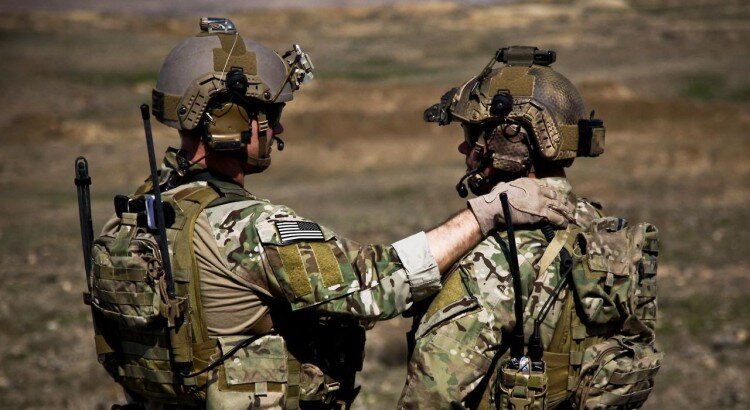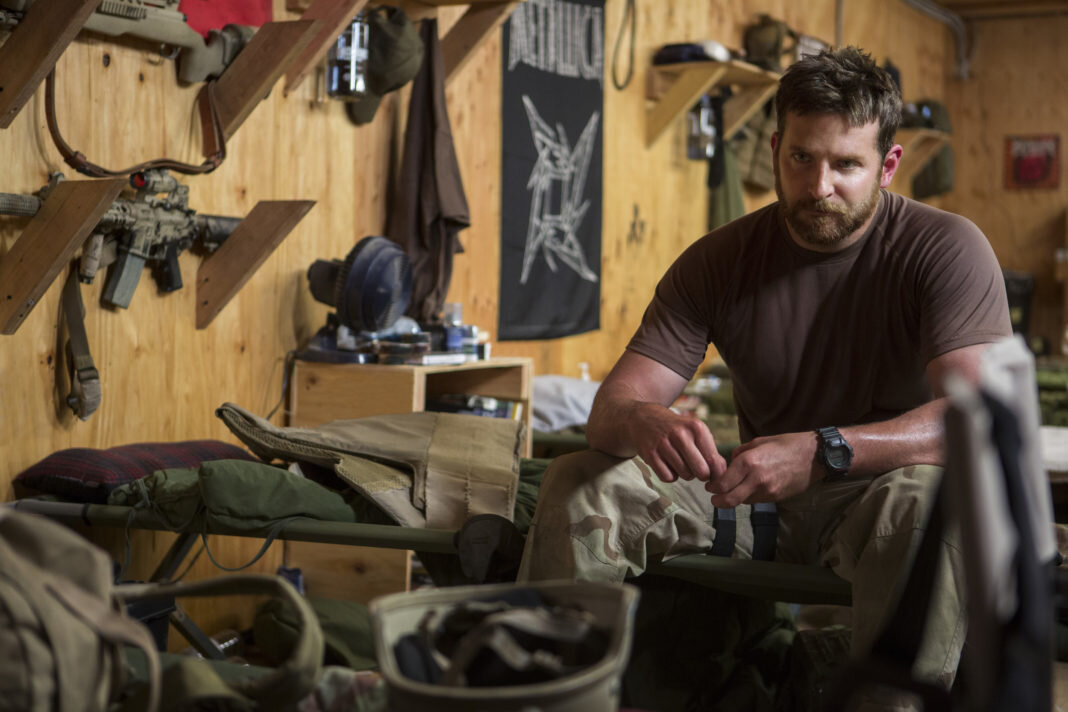
Why Fight? Some Analytic Philosophy & A Politically Incorrect Answer
Editor’s Note: This article originally appeared, slightly altered, in a 2 Part series in Havok Journal under the title "Warfighter Intentions, the Munchhausen Trilemma & More". This article is posted with permission of the original author.There is a guy now known to many as The Reaper. I admire him greatly; not only has he single-skindedly blocked Salon from using their incessant “white privilege” moniker when referring to anything involving guns or the United States, but Army Ranger/Sniper Nick Irving also killed dozens of men while carrying out combat operations overseas. In an interview with a FOX News blonde, Irving was loosely questioned about his mindset and motivation. Irving replied with the following, “You do it for your brothers, that’s the reason why I did it… I just wanted to be there for the 75th Ranger Regiment.”And he probably did do it for his brothers; there is no reason to doubt him. But his response got me thinking, what of these said brothers; what were their intentions? Could they all have had the same as Nick? Is that even logically possible?It is here I get to punch in some technical philosophy for my trigger-pulling family. Note that in philosophy one of the greatest tools is the ‘thought-experiment’; where you merely plug in working conditions and see where it takes you. To wit:Epistemology is the realm of study that focuses on knowledge, its acquisition, and especially its limits. Housed within Epistemology is the Munchhausen Trilemma. (Stay with me, grind through the next few lines, it will bear fruit, I promise)The trilemma is ever-present in daily life, or at least it can be utilized. When providing proofs for any theory, and condition, and proclamation- the trilemma provides only three options to explain a purported truth.Option #1 – The circular argument (proofs support the other. A allows B, B allows C, yet C allows A…)Option #2 – The regressive argument (each proof requires another proof. A allows B, B -> ad infinitum)Option #3 – The axiomatic argument (the proof is an acceptance of a brute fact. A just is)Pose the question “could all warfighters be fighting for the man next to them?” as the statement “all warfighters fight for the man next to them”. Applying the trilemma quickly rules out the first two options, and subsequently answers the original question with a resounding “NO.”In a war it is certainly normal for all combatants, say a platoon-sized group, all fighting to preserve the lives of the individual members. However, this does not answer why they are there. Twenty soldiers all standing in a circle pointing to the man to his left and saying “I’m doing this for you” explains little as to why they stormed the berm, kicked in the door, or came to the combat zone at all. In an incumbent role, perhaps being sieged by an invading force, a uniform need to preserve friendly life is a viable answer. However, as an occupation force, as a warfighting entity that flies across an ocean and patrols farms, towns, valleys and mountains—an explanation must be provided as to why they were conducting such operations to begin with.Option #2 doesn’t provide us with much help either. Imagine a column of soldiers, aligned to the right, beginning with a single man. The man is asked the question “why are you fighting?”, and his response is “for the man next to me”. The questioner goes to the man next to him, asking this second man the same question, and he gets the same answer as before. Same with the third man, and same with the forth, and so on. If this was the case than presumably this column would go on forever.Eventually someone has to be in the fight for a different reason. Even if we take this thought-experiment of Option #2 to its extreme, there would eventually have to be one man that went to war for a reason other than “the man next to him”, thus validating this magnificent chain of support. Just one man saying “for the GI Bill” allows, via the rules of logic, for a thousand to answer similar to how Nick Irving did; one joining after the other, to protect the man that joined right before him.Option #3 is where the answer resides. For the GI Bill, to defend the Constitution, to get out of Wyoming… These axiomatic motivations, or brute motivations if you will, give explanation for all the “for the guy next to me” ones. These axiomatic motivations have been addressed not only by Hollywood but by the GWOT-generation writers, voices, and social media aficionados. So what have they had to say?-Here is where the philosophy ends and the socio-literary commentary begins-With very few exceptions, explanations are overtly patriotic, steadfast and dutiful. We went to kill jihadists to prevent a mainland invasion, overthrow terrorism-centric regimes, capture WMDs, provide support for stabilization efforts in the Middle East, and even…..liberate the Iraqi people (?).And are these accurate? Does the list portray a general sentiment? Absolutely it does. The problem is these are rosy, geo-political savvy dimensions of a multi-dimensional object. A few particular dimensions are, in the opinion of this writer, woefully neglected.Of course there is the noise from the predictable corners, pointing out with rabid hindsight the lack of WMDs; and usually capping it off with something about oil and the Illuminati. However, as an aggregate the war fighters who deployed to Iraq and Afghanistan seem to consistently provide an explanation to the general public, as canned as a lukewarm “thank you for your service” that we occasionally receive back from them.I think of the energy that occupied the rifle ranges, shoot houses, turrets—the place in space and time right before the flash bang detonated.------ There is an elephant in the room, one worth talking about.
*****
A friend of mine shot an Iraqi man three times in the head. This Iraqi had been connecting a cell phone to wiring protruding from an IED--- one that, to his misfortune, my friend’s team had been watching. My friend made sure he was dead. My friend made sure to tell me about it.What I took away from the conversation was my friend’s undeniable excitement. Not because he had simply shot and killed another human being: that was not the case and he possessed a moral fiber that was unimpeachable. Rather he was thrilled to have done his job, to have prevented coalition forces from being killed and/or maimed, and to have done the solitary act that is at the epicenter of the Marine Corps existence.I also took something else away; my frothing rage. It should have been me, my team, watching that IED! My friend was lucky, and I was envious.
*****
This month Obama signed the Clay Hunt Suicide Prevention for American Veterans Act. As this goes into effect it is imperative to remember the positive aspects behind it. If, after all, most citizens find being yelled at for a few weeks, then maybe getting shot at a few times, a terrible fate… then a few citizens decide to actually go through these experiences to the benefit of their nation, then their nation should provide the necessary steps to welcome them back to the society they preserved. Additionally, the statistics do not lie, and an unfortunate number of veterans are killing themselves. However, there is something embedded in the presuppositions that give the act its impetus. It is becoming more and more politically correct, and (therefore) socially expected, for veterans to be damaged, weak beings. People whose humanitarian ideals and patriotic duties were somehow crushed and now left to wallow in despair.I for one didn’t risk everything, brace against environmental extremes, and fight both tooth and nail to emerge into a presumed modern warrior class, all to be patronized as a broken vessel of botched foreign policy.Are we?Anyone who has ever eavesdropped on a huddled group of drinking veterans knows this is simply not the case. Tales of righteous headshots, MK-19 thuds, and flying down some winding hardball with the rest of a lively platoon burst from smiling faces. Bearded, tattooed men with hoodies adorned in rifles and skulls hug and back-slap the other, as if retelling that home team interception in last night’s game. Nowhere is there quivering lips and lamentations of current instability in the region, nor is there some moral pondering of past actions. The alleged broken are often quite whole, the alleged reluctant warriors are far from reluctant.But where is this voice outside the bar and barbeque? What reasons ultimately make these attitudes a clandestine celebration?The warm, general audience explanations have been essentially mined out. Tired faces pandering to soccer moms and ghost writers have expelled the reservoir of socially acceptable rationale.The axiomatic, brute, motivations are there; stitched behind a generation of mouths. This perceived stitching is arguably the most troublesome feature of the whole ugly muzzle.“I wanted to fuck shit up! I wanted to go to war! I wanted to fight! I wanted to be tested in combat! I didn’t really care about Iraq! I didn’t really care about Afghanistan! I was young, adventurous and daring; I saw a calling—and I answered it!”These proclamations sync poorly with the current mood: veterans merely being nationalists whose love for democracy, Judeo-Christian God, and fellow American lead them to physical and mental ruin… now deserving pity and a free meal. They sync poorly with those that carelessly toss about the word “Hero” and terms like “Our best and our brightest”, and of course those who feel the primary mission of the U.S. Military is to facilitate role models for kids.However, it is a reality; a silenced, uncomfortable reality. And I truly believe if more combat veterans expressed this reality, after the dust cloud of limp-wristed outcry settled, it would do more for the aggregate mental health of the GWOT Veteran than any medicine or transitional program that is around today.Don’t be ashamed of your reasons for fighting. Political sentiment shifts; but recalling the videos circulating in 2005, those boyish faces atop armor and weaponry, tongues out and wide-eyed; in the background the carnage you left in your wake… you were harder than any socio-political back lash. You still are.- Mr. Blonde
Written By David Rose (AKA Mr. Blonde)
February 25, 2015









